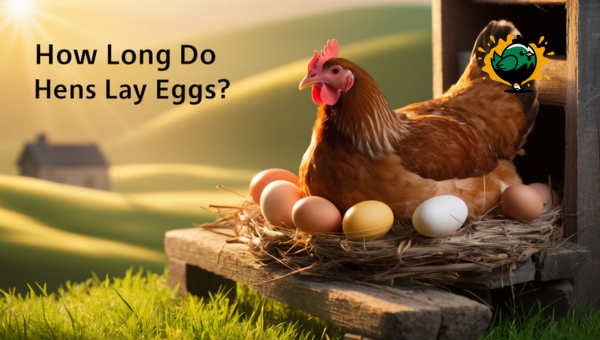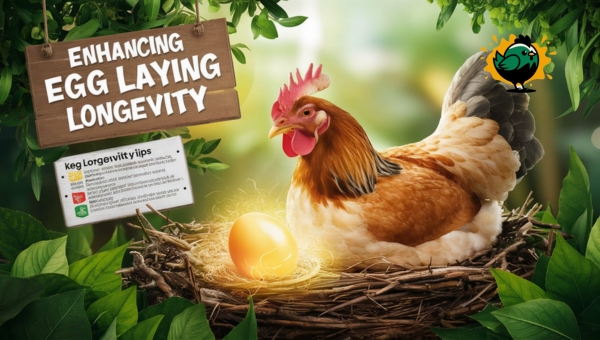How Long Do Hens Lay Eggs? The Ultimate Guide

There’s something truly satisfying about collecting fresh eggs from your own hens each morning. For many, this delightful routine is the reason behind starting a small backyard flock. But how long do hens lay eggs? Before you dive into this rewarding venture, it’s essential to grasp the intricacies of the egg-laying cycle and its influencing factors.
From understanding peak production years to recognizing signs of decline, this guide will equip you with all the knowledge you need. Whether you’re an experienced chicken keeper or just beginning your journey, learn how to maintain your hens’ health and productivity for as long as possible. Get ready to delve into the fascinating world of egg production!
Understanding Egg-Laying in Hens
Hens begin laying eggs once they reach maturity, typically around 18 to 20 weeks of age. This period marks the start of their productive phase, during which they can lay eggs regularly.
The frequency and number of eggs a hen lays depend on several factors, including breed, health, and environmental conditions.

Hens are most productive in their first two years, with some breeds capable of laying over 300 eggs annually.
However, egg production often tapers off as hens age. It’s important to provide optimal care, including proper nutrition and living conditions, to maintain consistent egg-laying. Understanding these aspects can help in managing a flock effectively for sustained egg production.
Factors Affecting Egg Production
Several factors influence how long hens lay eggs, impacting their productivity and the number of eggs they produce.

These factors can vary from environmental conditions to genetic predispositions:
- Breed: Some hen breeds are naturally more prolific egg layers than others. Certain breeds are known for higher production rates.
- Age: As hens age, their egg production typically declines. Younger hens generally lay more eggs.
- Nutrition: A balanced diet rich in proteins and essential nutrients is crucial for optimal egg production.
- Light: Hens require a certain amount of daylight exposure to sustain egg laying. Insufficient light can reduce egg production.
- Stress: Environmental stressors such as predators or overcrowding can negatively impact egg production.
Understanding these factors helps in managing hens effectively for better egg production.
Lifecycle of Egg Production
Understanding the lifecycle of egg production in hens is essential for those interested in poultry farming. Hens have distinct stages in their egg-laying journey. Initially, they reach a period when they lay the most eggs. However, as they age, the number of eggs they produce begins to decrease.
Let’s explore these stages in more detail, focusing on the peak laying period and the reasons behind the decline as hens grow older.
Peak Laying Period
During the peak laying period, hens typically reach their highest egg production. This stage usually occurs when hens are between 6 to 12 months old. At this time, they are in their prime, producing an egg almost every day.
The frequency of laying during this period is influenced by factors like breed, nutrition, and environment. It is crucial to provide optimal conditions to maximize egg production. Ensuring that hens have access to a balanced diet and a stress-free environment can help maintain this high level of productivity during their peak.
Decline in Egg Production
As hens age, a decline in egg production naturally occurs. This decrease often starts after the hens reach about 18 months to 2 years.
Several factors contribute to this decline:
- Aging: As hens grow older, their reproductive systems slow down, leading to fewer eggs.
- Nutrition: Inadequate nutrition can speed up the decline. Older hens require specific nutrients to maintain some level of production.
- Health Issues: Older hens are more susceptible to diseases, which can impact their ability to lay eggs.
- Daylight: Reduced daylight hours can also contribute to decreased egg production, as hens rely on light to stimulate laying.
Understanding these factors is key to managing egg production effectively. Adjustments in care and management practices can help mitigate some of the declines and ensure that hens continue to lay eggs for as long as possible.
Enhancing Egg Laying Longevity
When it comes to egg-laying longevity in hens, certain strategies can play a significant role in extending their productive years. Two key areas to focus on are nutritional management and stress reduction. By understanding these factors, you can help your hens maintain consistent egg production over time.

Nutritional Management
A well-balanced diet is crucial for hens to lay eggs over a prolonged period. To support optimal egg production, consider the following dietary elements:
- Protein: Hens require a diet rich in protein to maintain their energy levels and support egg formation. This can be sourced from feeds containing soybean meal or fish meal.
- Calcium: Calcium is essential for strong eggshells. Ensure that hens have access to calcium-rich sources like crushed oyster shells or limestone.
- Vitamins and Minerals: A variety of vitamins and minerals, such as vitamin D and phosphorus, support overall health and egg production. These can be included in commercial layer feeds.
- Fresh Water: Consistent access to clean and fresh water is important, as dehydration can reduce egg production.
Stress Reduction
Reducing stress in hens can lead to better productivity and more consistent egg-laying. Consider these approaches:
- Environment: Provide a safe and comfortable living space, with adequate space per bird to prevent overcrowding.
- Predator Protection: Ensure that the coop is secure from predators, which can cause stress and disrupt laying patterns.
- Routine Care: Regular health checks and vaccinations can prevent diseases that may stress hens.
- Consistent Schedule: Maintain a regular feeding and care routine to create a predictable environment for the hens.
Also Read: How To Stop a Chicken from Brooding – Effective Tips Revealed
Common Myths and Misconceptions
When it comes to how long hens lay eggs, many myths and misconceptions exist. Let’s debunk a few:
- Myth: Hens lay eggs every day throughout their life.
Reality: While hens may lay consistently during their peak years, egg production naturally declines with age. - Myth: Roosters are needed for hens to lay eggs.
Reality: Hens can lay eggs without a rooster; roosters are only needed for fertilization. - Myth: All hens lay the same number of eggs.
Reality: Egg production varies based on breed, health, and environmental factors. - Myth: Artificial light harms egg production.
Reality: Properly managed artificial lighting can support consistent laying, especially in winter months.
By understanding these truths, one can better manage and care for laying hens.
FAQs
How long do hens typically lay eggs?
Hens generally lay eggs for about 1 to 3 years. The peak production usually occurs in the first year, and it gradually decreases as they age.
At what age do hens start laying eggs?
Hens typically begin laying eggs at around 5 to 6 months of age. This can vary depending on the breed and overall health of the hen.
What factors influence the egg-laying period of hens?
The egg-laying period can be influenced by factors such as breed, diet, and environmental conditions. Proper care and nutrition are essential for optimal egg production.
How many eggs can a hen lay in a year?
On average, a hen can lay between 200 to 300 eggs annually during its peak laying period. This can fluctuate based on factors like breed and management practices.
Is it possible to extend the egg-laying period of hens?
Yes, by ensuring a balanced diet and reducing stress, the egg-laying period can be extended. Proper care and management can help maintain productivity.
Conclusion
Understanding how long hens lay eggs is essential for both backyard hobbyists and commercial egg producers. While hens generally start laying at 18-20 weeks and reach their peak production in the first year, it’s crucial to consider the factors that influence egg-laying longevity.
By focusing on proper nutrition and reducing stress, you can extend their productive years. Misconceptions about egg production often lead to confusion, so having accurate knowledge is vital. In summary, a well-informed approach helps ensure a steady egg supply.
If you found this information valuable, explore more insightful articles on our site to deepen your understanding of poultry care and management.
